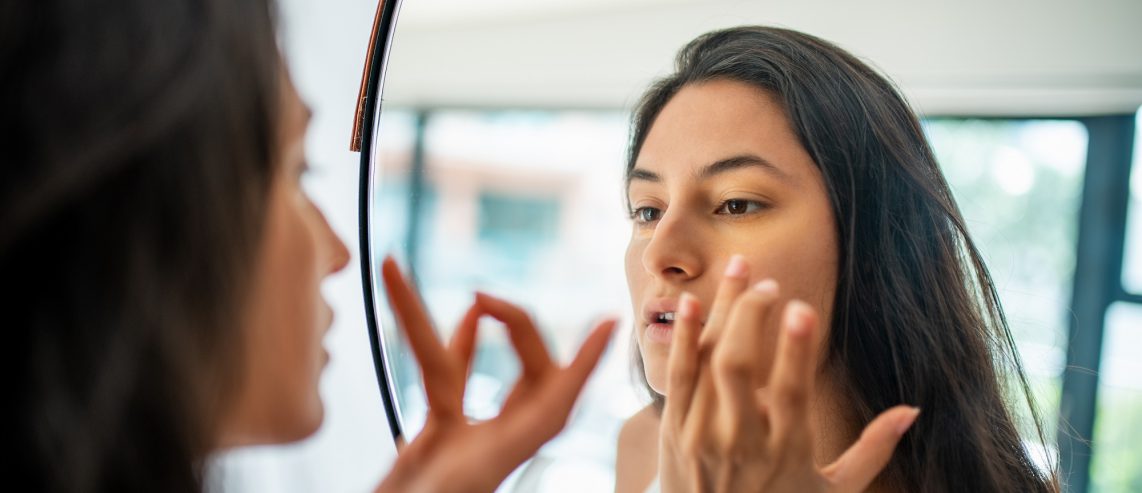If you’ve bought cosmetics lately, you may notice that some labels say “paraben-free.” You may wonder: What exactly are parabens? And are they something you should avoid?
Here’s what we know about these common additives.
What Are Parabens?
Parabens are a group of chemicals commonly used as preservatives in food and cosmetic products to give them a longer shelf life.
You can find parabens in skincare products and makeup, including mascara, lipstick, foundation, and concealer. Parabens are also in toothpaste, shampoo, and body lotion. They stop the growth of fungus and bacteria in these products.
Manufacturers have also added parabens to commercial food products since the 1950s. Foods with parabens don’t spoil as quickly as they would otherwise. Parabens are in soft drinks, frozen dairy products, cereals, beer, processed vegetables, and condiments.
Parabens also occur naturally in some foods, like blueberries and barley.
Never Miss a Beat!
Subscribe to Our HealthBeat Newsletter!
Thank you for subscribing!
You can now select the specific newsletters you'd like to receive.
You are already subscribed.
Subscribe to more newsletters in our email preference center.
Sorry, an error occurred. Please try again later.
Get Healthy Tips Sent to Your Phone!
Do Parabens Get Into the Body — and Are They Safe?
Parabens do get absorbed through your skin via lotion, shampoo, makeup, and other skin care products. They also enter the bloodstream through foods that we eat. Most people in the U.S. have some level of parabens in their bodies.
In recent years, researchers have become concerned about parabens, asking questions such as: Are parabens bad for skin? Do parabens cause cancer?
The answers aren’t clear.
Some studies have suggested that parabens act like the hormone estrogen in the body. Estrogen is a female hormone that can causes breast cells (normal and cancerous) to grow and divide. In addition to raising the risk of breast cancer, hormone disruption can lead to weight gain, early puberty, and irregular periods.
Because of these concerns, a number of countries in Europe and Southeast Asia have banned the use of some parabens in cosmetics.
However, parabens are still in many products in the U.S. The U.S. Food and Drug Administration doesn’t have any specific regulations against preservatives in skincare products. Cosmetic products and ingredients other than color additives do not need FDA approval before they go on the market.
The Centers for Disease Control and Prevention (CDC) states that health effects from low levels of parabens are unknown. They continue to look at scientific studies about potential hazards of parabens.
How Do I Know If a Product Contains Parabens?
Products in the U.S. must list their ingredients on the packaging. Parabens are easy to spot because they contain the word “paraben” as a suffix. Some common parabens are:
- Methylparaben
- Ethylparaben
- Propylparaben
- Butylparaben
- Isobutylparaben
Manufacturers sometimes use parabens in combination with other preservatives to protect against a broad range of microbes.
Should I Buy Paraben-Free Skincare Products?
Scientific studies about the safety of parabens are ongoing. Whether or not you buy paraben-free lotion, makeup, and other products is a personal choice.
If you decide to go paraben-free, know that:
- Paraben-free products are not hard to find. Many natural and organic skincare products today are paraben-free. Most commercial brands of deodorants no longer contain parabens.
- You should check ingredients. Read the ingredient list to check for parabens. Or simply look for products labeled “paraben-free.”
- You need to use them quickly. Be aware that paraben-free products have a shorter shelf life than those with preservatives. You’ll need to replace them more frequently than products containing parabens, so keep an eye on the expiration date.
If you have questions or concerns about parabens and skincare, ask your dermatologist for advice.
Sources
U.S. Food and Drug Administration, Parabens in Cosmetics, Link
Centers for Disease Control and Prevention, Paraben Factsheet, Link
American Cancer Society, Antiperspirants and Breast Cancer Risk, Link
Scientific American, Should People Be Concerned About Parabens in Beauty Products? Link
National Cancer Institute, Antiperspirants/Deodorants and Breast Cancer, Link
The Guardian, US cosmetics are full of chemicals banned by Europe — why? Link
Environmental Working Group, What Are Parabens, and Why Don't They Belong in Cosmetics? Link
About Dermatology
The UPMC Department of Dermatology diagnoses, treats, and manages numerous hair, skin, and nail conditions and diseases. We care for common and uncommon conditions, and our treatments include both surgical and nonsurgical options. We operate several specialty centers for various conditions. The UPMC Cosmetic Surgery and Skin Health Center is a comprehensive dermatologic laser facility, offering a full range of cosmetic services and procedures. With UPMC Hillman Cancer Center, we offer a Skin Cancer Program that provides complete care from screenings, diagnosis, treatment, and beyond. Find a dermatology provider near you.
